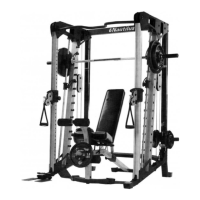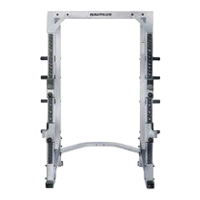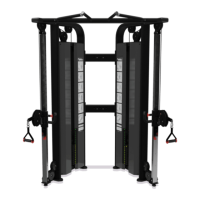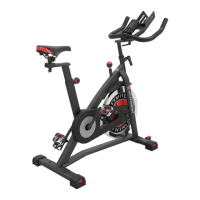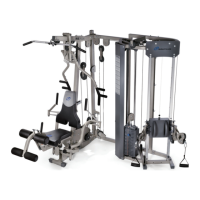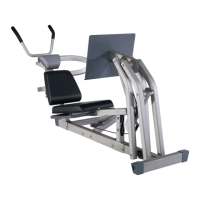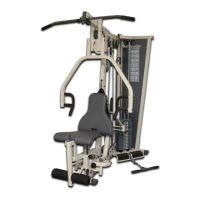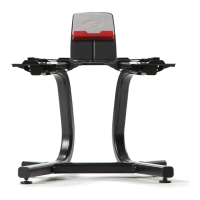Do you have a question about the Nautilus EVO S9AA and is the answer not in the manual?
Guidelines for using Nautilus equipment safely, keeping clear of moving parts, and seeking professional advice.
Instructions on securing equipment to a solid surface using specified fasteners for stability.
Equipment for commercial gyms; users should read manual, get physicals, and be instructed.
Not for children; requires supervision for persons with reduced capabilities or lack of experience.
Avoid overexertion; stop if pain or abnormal symptoms occur and consult a physician.
Owner's responsibility to ensure regular examination, repair, or removal of damaged equipment.
Ensure all adjustment and locking features are properly secured before using the equipment.
Replace frayed or damaged cables/belts immediately; inspect couplers for wear.
Use only Nautilus replacement parts; substitutes void warranties.
Wear appropriate clothing/shoes, tie back hair, keep towels away, face forward, avoid turning while moving.
Ensure weight stack pins are fully engaged; never pin elevated weights or attempt to release jammed parts.
Use only Nautilus-provided means for resistance; do not exceed 350 lbs user weight limit.
Ensure adjuster pins are fully engaged in holes when adjusting seats, pads, or limiters.
Purchaser's responsibility to instruct end users on proper operating procedures.
Nautilus Strength machines use latest science; assembled/tested at factory, partially disassembled for shipping.
Purchaser to instruct users; recommended to use in supervised areas; consult physician before exercise.
Lists basic and specialty tools recommended for performing maintenance on the units.
Rules include supervision, following instructions, careful entry/exit, using shields, correct pins, proper use, reporting issues, keeping clear of moving parts.
Guidelines include physician check, familiarization, warm-up/cool-down, slow movement, breathing, firm grip, workout structure, and weight experimentation.
Schedule for daily, weekly, monthly, and bi-annually checking decals, belts, nuts, parts, and rotation points.
Schedule for cleaning upholstery, surfaces, removing dust, and lubricating guide rods.
Cautions include avoiding spraying liquids directly, spraying on towels, tightening loose parts, and avoiding direct sunlight.
Inspect frame for rust, bubbling, or paint chips; repair damaged areas promptly.
Apply TFL#50 Wet Lubricant to a clean cloth and use to clean and lubricate guide rods.
Warning: Do not lubricate mini-weights as it may cause damage and void the warranty.
Keep pads clean, disinfect daily, and clean outside surfaces with appropriate cleaners.
Wipe painted surfaces with a damp cloth and car wax, then dry and buff.
Clean with non-abrasive cleaners; vacuum or wipe dust from recessed areas.
Clean guide rods monthly; clean internal tower/weight stack semi-annually with mild soap and water.
Step-by-step guide for adjusting the hydraulic unit, involving pins, cables, nuts, and shafts.
List of common replacement parts for the hydraulic unit, including handles, grips, and cables.
Procedure for tightening belts using shims and bolts, involving weight stack manipulation.
Guidelines for inspecting cables, fasteners, handgrips, upholstery, pulleys, and main frame for wear or damage.
Illustrations and descriptions of common cable damage like torn sheath, stretching, and kinking.
Importance of maintaining label integrity and placement; ordering replacements for missing or damaged stickers.
| Brand | Nautilus |
|---|---|
| Model | EVO S9AA |
| Category | Fitness Equipment |
| Language | English |




